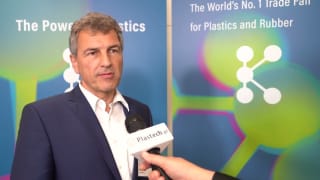Unique design for reduced cycle time
As a result of the efficient design whereby product removal occurs at the same time as the overmoulding processes, the overall cycle time is reduced by approximately five seconds. "This is quite spectacular," notes Rahnhöfer.
Referencing other special features of the project, Rahnhöfer draws attention to the individual positioning of each injection stage elaborating: “In order to simplify the screw change, we intentionally opted to arrange all three injection units horizontally, the second (L) at a 90-degree angle and the third (Y) at a 40-degree angle.”
Addressing another potential challenge - the 3.3 metre ceiling height in the production hall - a 6-axis ABB robot from S.A.R. was selected. This allowed the design team to locate the robot on a higher base enabling it to reach over the bars of the injection moulding machine, remove product from above, and place the finished parts on a conveyor belt, confirms Rahnhöfer. “At the same time we factored in the company’s existing product portfolio ensuring the system and robot would be compatible for handling and overmoulding all ranges,” adds the automation specialist.
Delivering on precision
PB Swiss Tools builds the grippers for the tool handles themselves, adjusting them to their different SKU s. “Each new grip requires three pairs of new inserts. The toolmaker has done an excellent job here,” asserts Klaus Rahnhöfer, pointing out that combined with the moulding precision on all-electric machines helps to reduce material waste. "Since the project involves many product variants, numerous insert and gripper changes are required. High accuracy is essential to keep the start-up scrap as low as possible," he sums up.
The IntElect series is renowned for delivering high precision and efficiency. Much of this can be attributed to the company’s servo motors which are designed and built in-house by Sumitomo (SHI) Demag. The dosing is fully electric to ensure the highest degree of accuracy. The machine design also features a unique automatic tie-bar pull on the operating side. "The tie-bar hoists are normally only used in hydraulic machines, however, we have adapted them to suit our all-electric machines," reports Rahnhöfer. In addition, the servo motor of the index drive was integrated into the control system.
"The precision of the all-electric injection moulding machine was an important consideration," confirms Mathias Gerber, Plastics Engineering Manager at PB Swiss Tools. However, good service and innovative technologies that addressed all of the company’s requirements were decisive factors for choosing Sumitomo (SHI) Demag. “We approached several machine manufacturers, but the solution from Schwaig was by far the best," he confirms, “Due to the removal from the fourth position in the closed tool, we save cycle time which will ultimately give us a faster ROI. Using an index drive rather than robots was also a persuasive advantage that convinced our management team to support this investment,” expands Gerber.
The enthusiasm for this project was echoed throughout the plant. Urs Wespi, Production Manager at the PB Swiss Tools injection moulding plant reports: “Decades of experience working with technology installed by Sumitomo (SHI) Demag and the MAPAG agency fills me with confidence. The machines are not prone to failure. Yet, when you need support the service from the team is always excellent. If any error cannot be resolved with telephone support, a service technician comes within 24 hours. Few machinery manufacturers are this responsive."
Matching this uncompromising commitment to quality, the Swiss toolmaker claims that it is no coincidence that they ‘work with the best’. Like Sumitomo (SHI) Demag, this constant development to meet the highest requirements of their users is what drives them. PB Swiss Tools produces around 13 million professional hand tools and medical devices annually, all developed and manufactured in Switzerland. Many of their 3,000 ergonomically designed products come with a lifetime guarantee.



